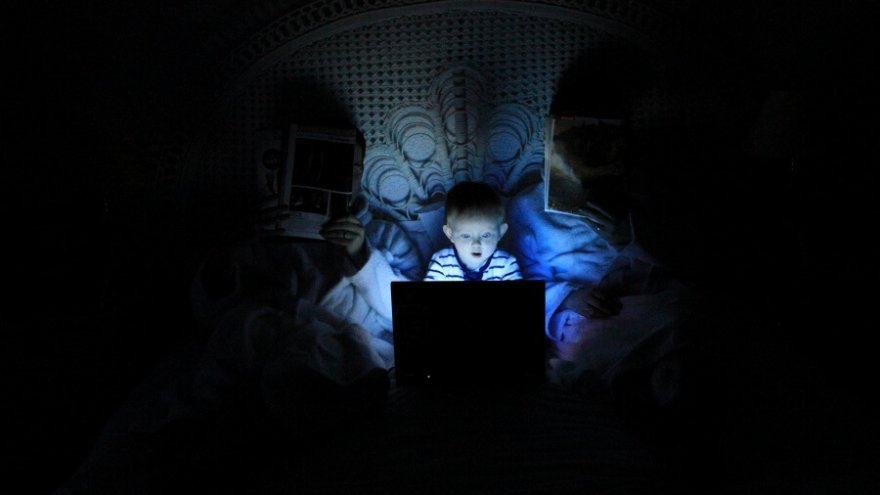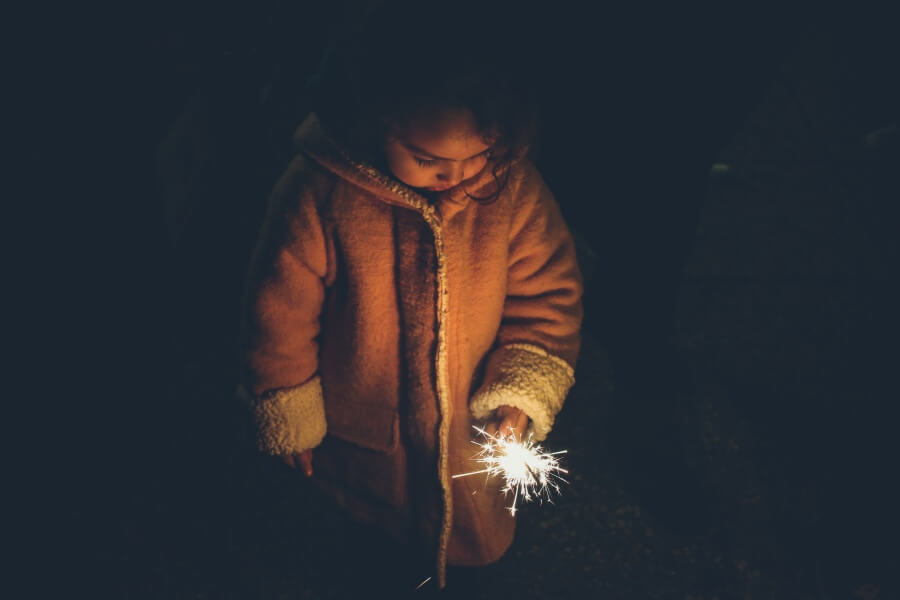How to Help your Children Overcome Their Fear of the Dark

Fears are nothing uncommon, not in adults and especially not in children. Everyone fears something, as much as they might insist otherwise. The only difference is that we all have various, different fears, which affect us on different levels. Some of these fears are more common than others, especially in children, but they can even be carried through life if not properly addressed in their childhood.
So what is the most common fear among little kids? The fear of the dark, of course. Usually, after the age of 2-3 years old, our young one’s imagination starts to develop and improve, and at that age, they’re still much too young to make the difference between what’s real and what’s fantasy. Then, the fear of the dark settles in, be it because of the shadow of the tree branches near the window have been poking against the glass all night due to the wind or rain, or because their crib’s placement makes it so that whenever someone’s going down the hall for the bathroom in the night, gigantic shadowy forms start to shape up.
It’s a natural fear for every child to have and most children grow out of it eventually, while others might be stuck with it later in life for various reasons. Generally, kids get over their fear of darkness once they are old enough to realize that there is no monster under their bed or closet, that is if they take initiative themselves and try to discipline themselves into overcoming their own fears and anxieties.
However, when it comes to little kids, if you want them to not be affected by such a fear for too long, there are plenty ways to try and help them overcome their distress when it comes to the dark. Here are a few of those ways that we have found helpful!
Work over their irrational fears
1) First of all, explain to them that whatever monsters they’re making up aren’t real. Depending on their age, kids can process logical facts easier, and if a parent is explaining to them why and how none of their fears of the dark are anything to worry about, then they could be more receptive to further teaching. Ask them what they think is waiting in the darkness, what they feel, and try to reason with them. A monster under the bed? How would it get there without us seeing it when the lights are on? And so on!
Get familiar with the source of their fear
2) Figure out whether their fear is truly darkness-related, or if it’s a fear of being left alone, or even if it’s a fear of whatever unknown things might be wherever the child can’t see anymore. Getting them a night light or leaving a hallway light on could prove to be useful rather than leaving the TV on and disturbing their sleep.
If they’re afraid of being left alone in the dark, then you could try giving them a toy to act as a guardian, like a doll or a plushie at the end of their bed, or right next to them on the pillow, or getting them a pet of smaller proportions, like maybe a little turtle or a fish, to have some sort of companionship. If you have a larger family, then you could consider pairing up the kids to sleep in the same room until they get over their fears as well!
Provide them a safe zone
3) Establish a bedtime routine. Before putting them to bed, establish a routine for you two to carry out and help the kid relax at the same time. After you did all the necessary hygiene things, read them a story or hug and kiss them, then invite them to check for anything scary while you’re still in the room. Check the closet doors, check under the bed with a flashlight and pull the rapes so no branches will terrify them at night. After the room is deemed to be a safe zone, all that’s left to do is sleep!
Control their environment before going to bed
4) Make sure they aren’t watching anything scary before bed. Plenty of cartoons or movies can have things in them which children can perceive as scary, regardless if they’re intended to terrify someone or not. Before going to bed, however, it’s best to try to have them watch something that won’t give them any anxiety and won’t cause them nightmares either. Watch a funny cartoon or play some family games instead!

Make sure that they are feeling calm and safe
5) Help them relax, preferably with a warm bath before bed, or a glass of warm milk. Cutting down on the sugar intake they have before their bedtime is also a good idea, so they don’t stock up on energy right before sleep and won’t have trouble falling asleep.
Thinking back on it, I remember how my own dad helped me get over my fear of darkness when I was somewhere around 4 or 5 years old. The memory stuck clearly with me because of the soothing tone he used and because of the overall gentleness he adopted throughout the process. He noticed I wouldn’t even get close to a room whose light was turned off in the evening, and as such, he picked me up and said that “we’ll go see if there’s anything there”.
Once arrived in the room, we stood in the middle, him holding me in his arms to give me that necessary sense of safety. He didn’t actually do much in terms of explaining, and it’s not needed in all cases, but what he did was to stay with me while our eyes adjusted to the dark, and then showed me around the room that there were the same objects and furniture as when the light was on and, surprisingly, nothing came to grab our foot in the dark!
He was not afraid of the dark, so I thought “why should I be, then?” and taking his example helped me overcome my own fear, just like your own example could help your own child.
When the time came to help my little sister overcome her own fear of the dark, the same strategy didn’t work anymore, so it only proved that it depends on the child (hence why we offered more than one way for you to deal with it!).
With her, we tried normalizing the idea of a dark room (since it was a scary idea for her regardless of how we felt about it) by carrying on with our business and walking into dark rooms more often, avoiding to turn on the lights so frequently or so quickly after it got darker outside, to give her some periods of time of adjusting to encountering darkness around. Having an older sibling (such as myself, in her case) also helped set an example as she tried to adopt the same fearless attitude more out of a natural instinct of copying what she saw rather than doing it consciously.
All in all, you have to find the proper way of helping your child overcome their fear of darkness depending on what strategies seem to appeal to them and what they’re more receptive towards. If it takes a parent’s example to do it, go that way! If it takes a bedtime routine to put them in control of their surroundings, then the end result will be just as good!






